HA3021 Corporations Law: Analysis of Director Duties - Flugge & Geary
VerifiedAdded on 2023/06/11
|10
|1577
|416
Case Study
AI Summary
This case study provides an in-depth analysis of the ASIC v Flugge & Geary [2016] case, focusing on breaches of director duties under the Corporations Act 2001. The case revolves around AWB Limited's transactions with an Iraq-based company and the misuse of the United Nations' Oil for Food Program. The study details the facts of the case, including allegations of indirect payments to the Iraq government and inflated wheat prices. It examines the specific duties breached, such as the duty of care and diligence under section 180(1) and the duty of good faith under section 181(1) of the Corporations Act. The court's decisions regarding the two directors, Flugge and Geary, are discussed, highlighting the importance of directors' reliance on information provided by others and the need for thorough inquiry. The study concludes by emphasizing the relevance of this decision in understanding directors' responsibilities and the potential consequences of breaching those duties.
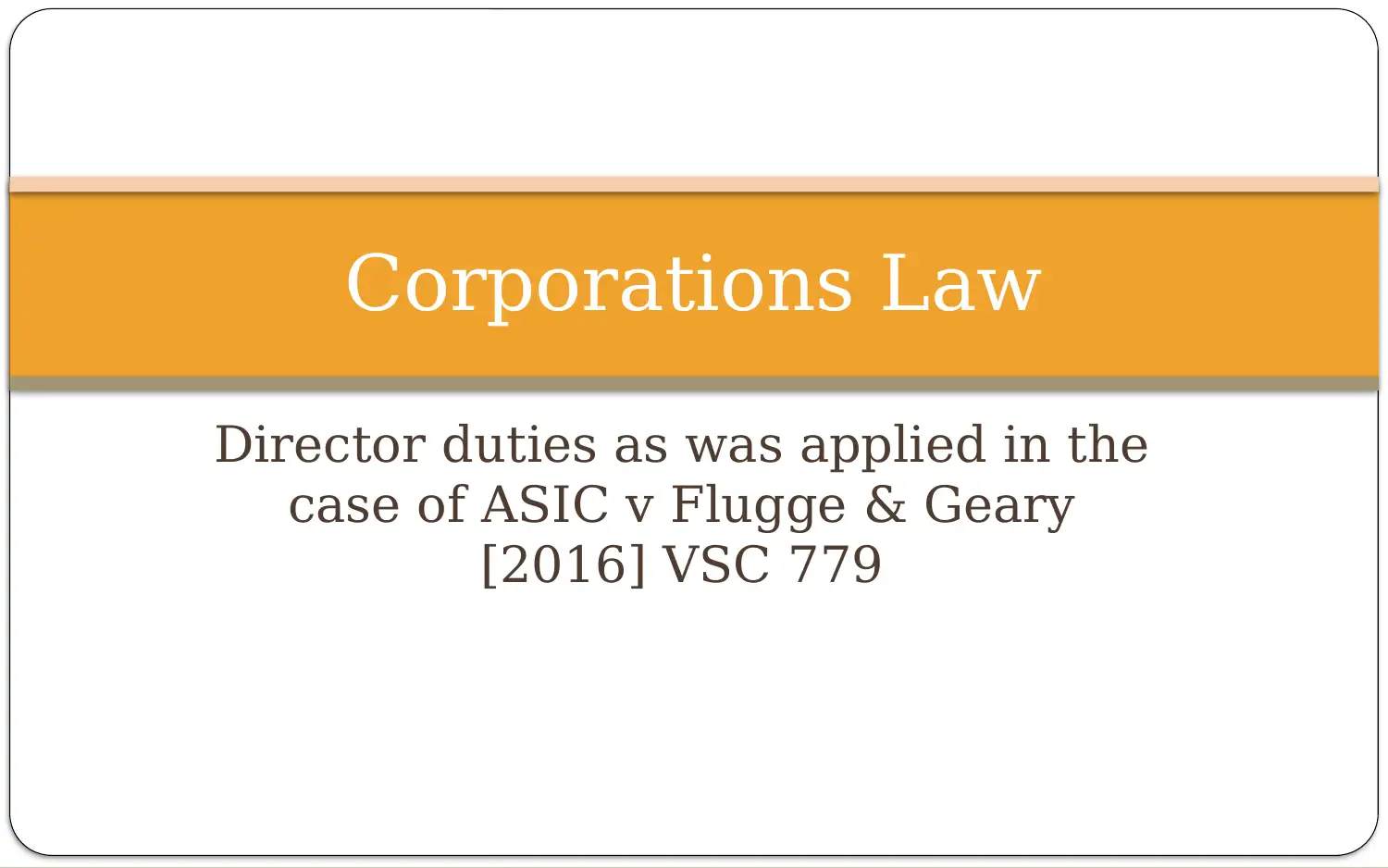
Director duties as was applied in the
case of ASIC v Flugge & Geary
[2016] VSC 779
Corporations Law
case of ASIC v Flugge & Geary
[2016] VSC 779
Corporations Law
Paraphrase This Document
Need a fresh take? Get an instant paraphrase of this document with our AI Paraphraser
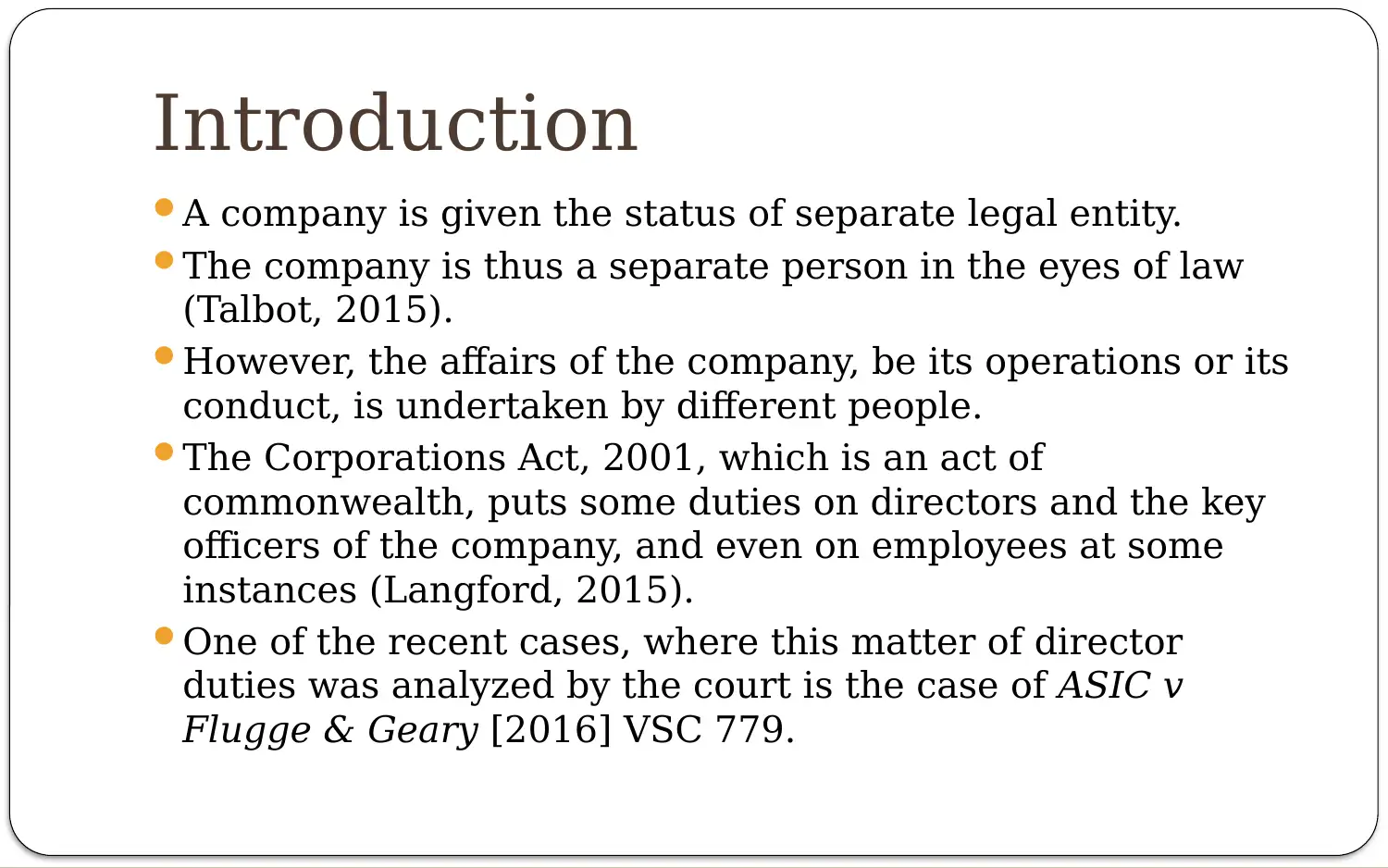
Introduction
A company is given the status of separate legal entity.
The company is thus a separate person in the eyes of law
(Talbot, 2015).
However, the affairs of the company, be its operations or its
conduct, is undertaken by different people.
The Corporations Act, 2001, which is an act of
commonwealth, puts some duties on directors and the key
officers of the company, and even on employees at some
instances (Langford, 2015).
One of the recent cases, where this matter of director
duties was analyzed by the court is the case of ASIC v
Flugge & Geary [2016] VSC 779.
A company is given the status of separate legal entity.
The company is thus a separate person in the eyes of law
(Talbot, 2015).
However, the affairs of the company, be its operations or its
conduct, is undertaken by different people.
The Corporations Act, 2001, which is an act of
commonwealth, puts some duties on directors and the key
officers of the company, and even on employees at some
instances (Langford, 2015).
One of the recent cases, where this matter of director
duties was analyzed by the court is the case of ASIC v
Flugge & Geary [2016] VSC 779.
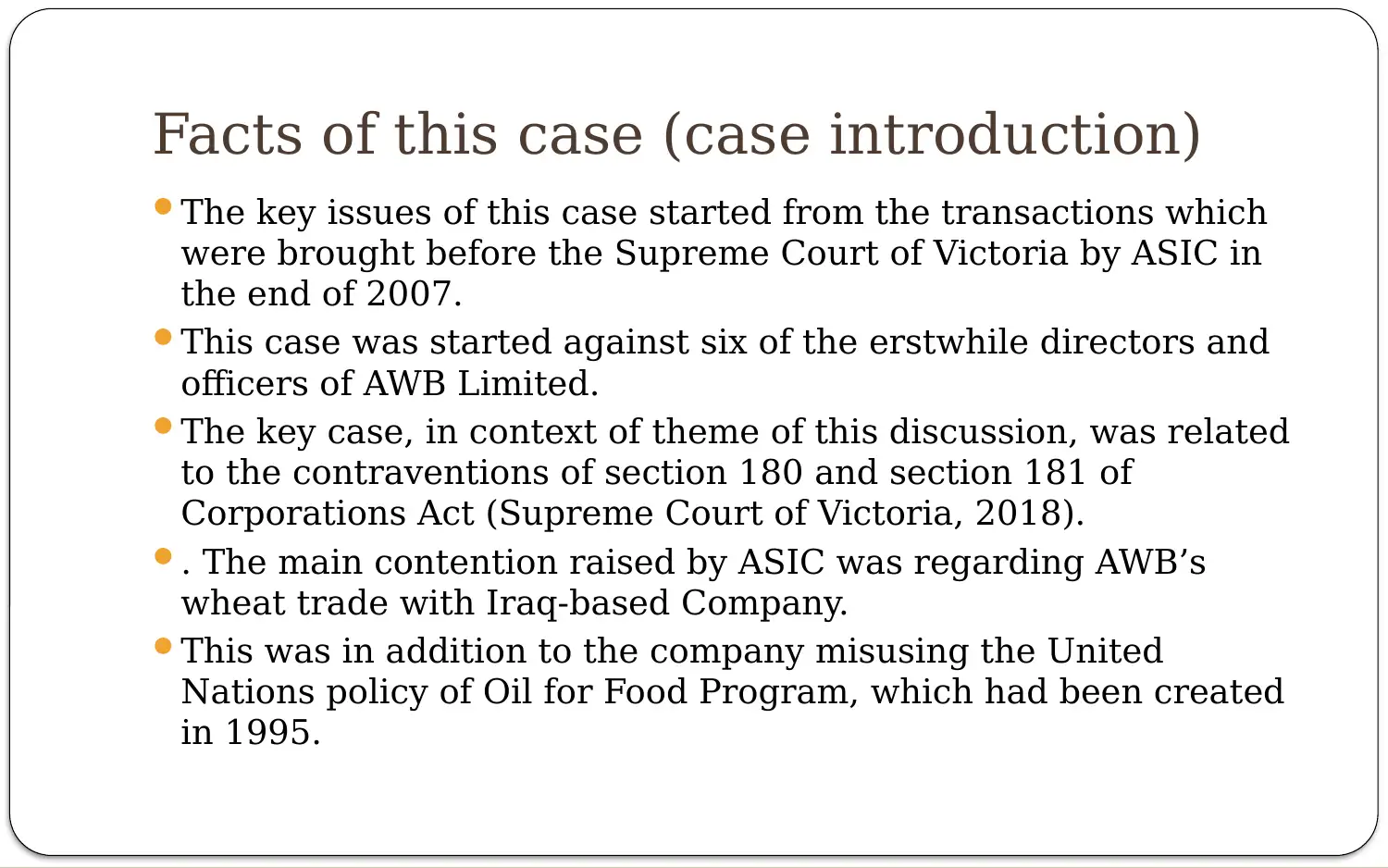
Facts of this case (case introduction)
The key issues of this case started from the transactions which
were brought before the Supreme Court of Victoria by ASIC in
the end of 2007.
This case was started against six of the erstwhile directors and
officers of AWB Limited.
The key case, in context of theme of this discussion, was related
to the contraventions of section 180 and section 181 of
Corporations Act (Supreme Court of Victoria, 2018).
. The main contention raised by ASIC was regarding AWB’s
wheat trade with Iraq-based Company.
This was in addition to the company misusing the United
Nations policy of Oil for Food Program, which had been created
in 1995.
The key issues of this case started from the transactions which
were brought before the Supreme Court of Victoria by ASIC in
the end of 2007.
This case was started against six of the erstwhile directors and
officers of AWB Limited.
The key case, in context of theme of this discussion, was related
to the contraventions of section 180 and section 181 of
Corporations Act (Supreme Court of Victoria, 2018).
. The main contention raised by ASIC was regarding AWB’s
wheat trade with Iraq-based Company.
This was in addition to the company misusing the United
Nations policy of Oil for Food Program, which had been created
in 1995.
⊘ This is a preview!⊘
Do you want full access?
Subscribe today to unlock all pages.

Trusted by 1+ million students worldwide
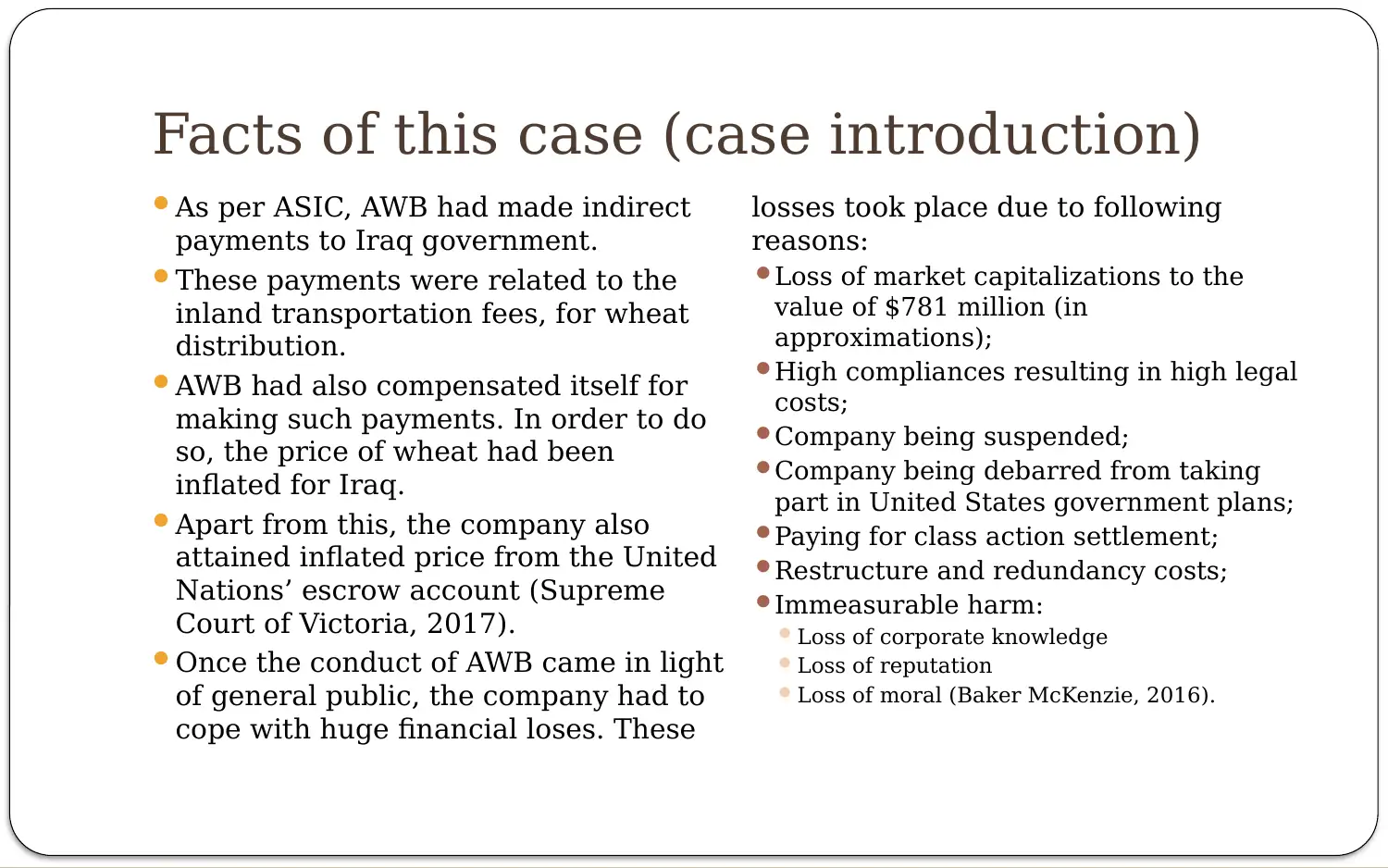
Facts of this case (case introduction)
As per ASIC, AWB had made indirect
payments to Iraq government.
These payments were related to the
inland transportation fees, for wheat
distribution.
AWB had also compensated itself for
making such payments. In order to do
so, the price of wheat had been
inflated for Iraq.
Apart from this, the company also
attained inflated price from the United
Nations’ escrow account (Supreme
Court of Victoria, 2017).
Once the conduct of AWB came in light
of general public, the company had to
cope with huge financial loses. These
losses took place due to following
reasons:
Loss of market capitalizations to the
value of $781 million (in
approximations);
High compliances resulting in high legal
costs;
Company being suspended;
Company being debarred from taking
part in United States government plans;
Paying for class action settlement;
Restructure and redundancy costs;
Immeasurable harm:
Loss of corporate knowledge
Loss of reputation
Loss of moral (Baker McKenzie, 2016).
As per ASIC, AWB had made indirect
payments to Iraq government.
These payments were related to the
inland transportation fees, for wheat
distribution.
AWB had also compensated itself for
making such payments. In order to do
so, the price of wheat had been
inflated for Iraq.
Apart from this, the company also
attained inflated price from the United
Nations’ escrow account (Supreme
Court of Victoria, 2017).
Once the conduct of AWB came in light
of general public, the company had to
cope with huge financial loses. These
losses took place due to following
reasons:
Loss of market capitalizations to the
value of $781 million (in
approximations);
High compliances resulting in high legal
costs;
Company being suspended;
Company being debarred from taking
part in United States government plans;
Paying for class action settlement;
Restructure and redundancy costs;
Immeasurable harm:
Loss of corporate knowledge
Loss of reputation
Loss of moral (Baker McKenzie, 2016).
Paraphrase This Document
Need a fresh take? Get an instant paraphrase of this document with our AI Paraphraser
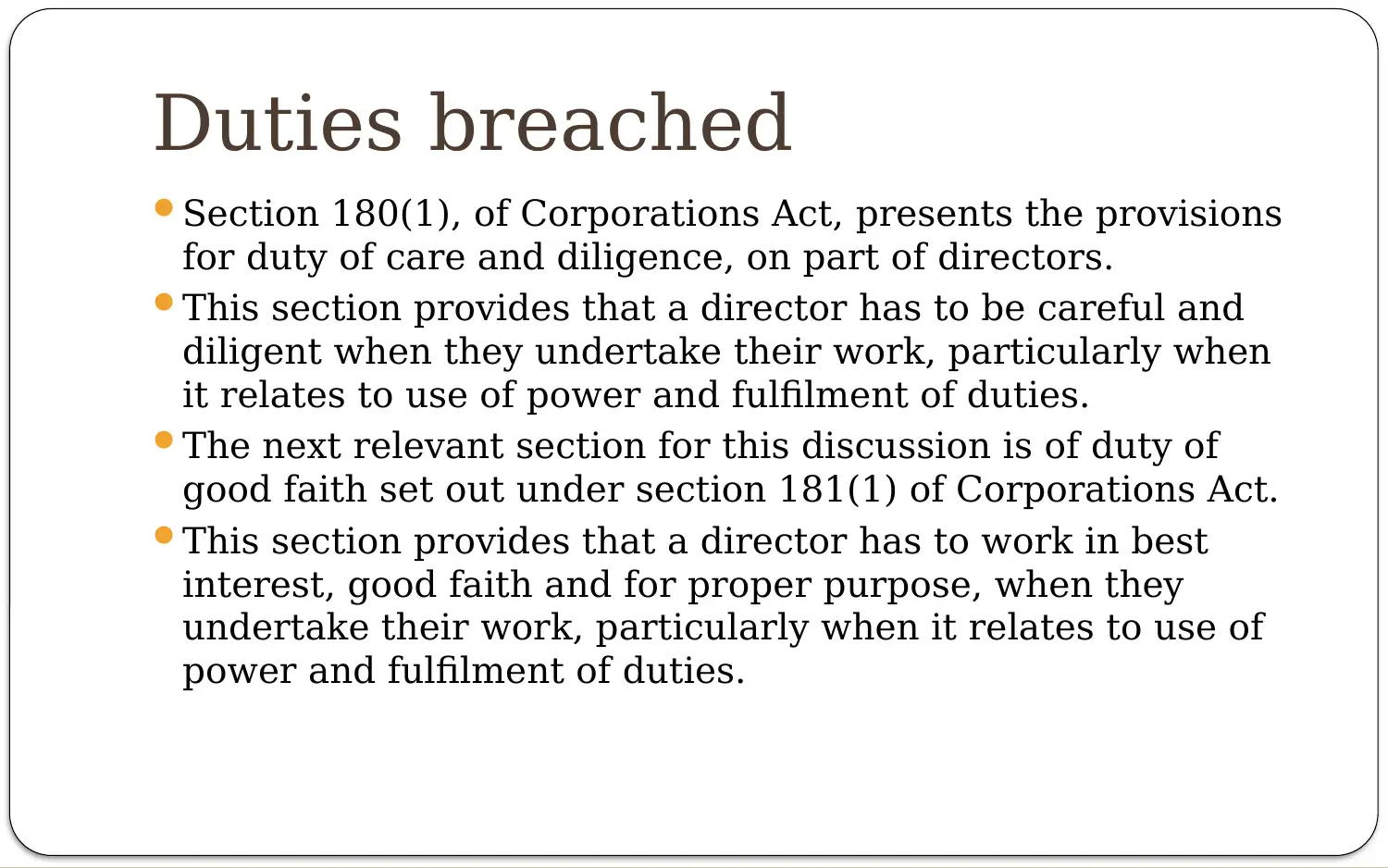
Duties breached
Section 180(1), of Corporations Act, presents the provisions
for duty of care and diligence, on part of directors.
This section provides that a director has to be careful and
diligent when they undertake their work, particularly when
it relates to use of power and fulfilment of duties.
The next relevant section for this discussion is of duty of
good faith set out under section 181(1) of Corporations Act.
This section provides that a director has to work in best
interest, good faith and for proper purpose, when they
undertake their work, particularly when it relates to use of
power and fulfilment of duties.
Section 180(1), of Corporations Act, presents the provisions
for duty of care and diligence, on part of directors.
This section provides that a director has to be careful and
diligent when they undertake their work, particularly when
it relates to use of power and fulfilment of duties.
The next relevant section for this discussion is of duty of
good faith set out under section 181(1) of Corporations Act.
This section provides that a director has to work in best
interest, good faith and for proper purpose, when they
undertake their work, particularly when it relates to use of
power and fulfilment of duties.
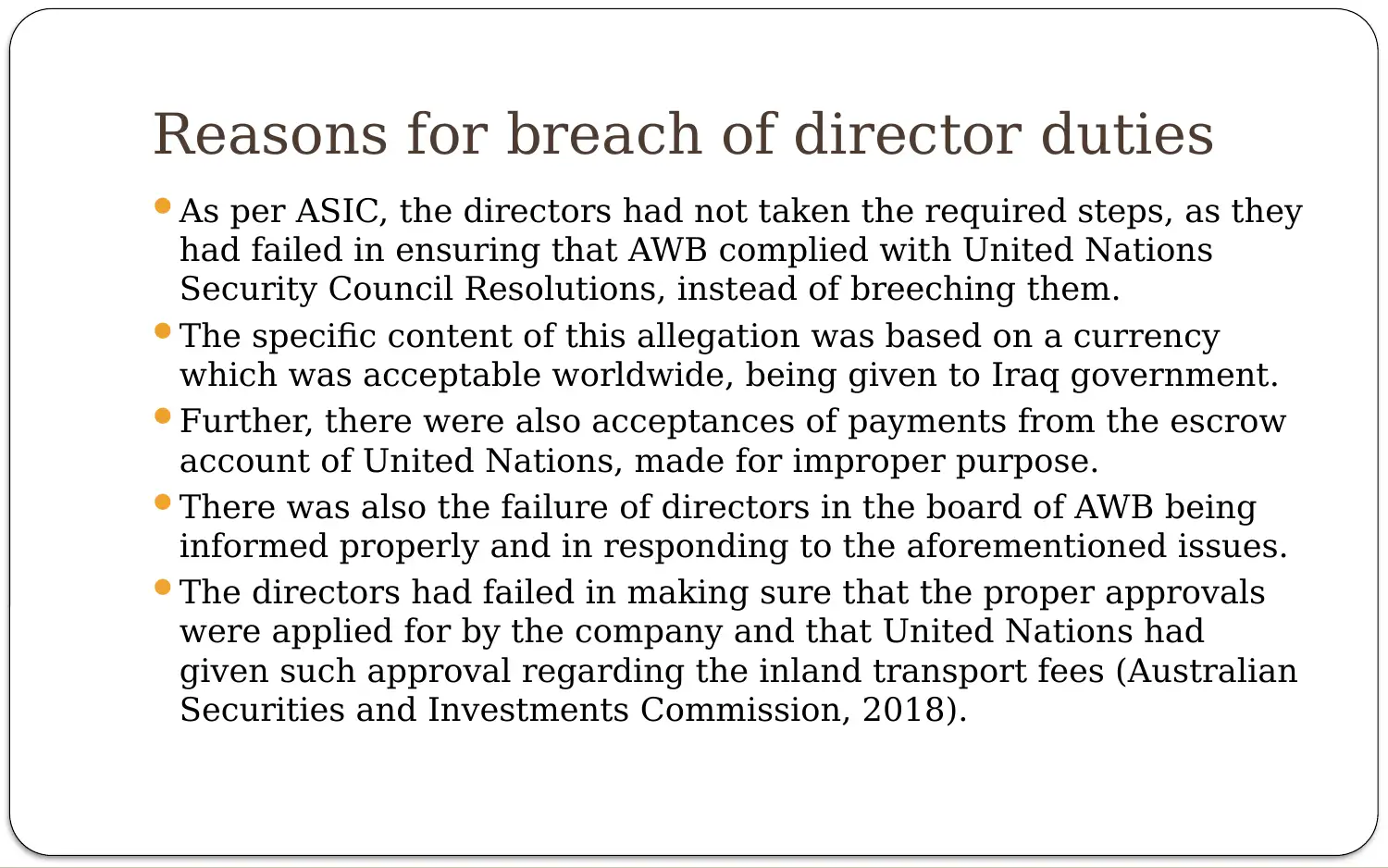
Reasons for breach of director duties
As per ASIC, the directors had not taken the required steps, as they
had failed in ensuring that AWB complied with United Nations
Security Council Resolutions, instead of breeching them.
The specific content of this allegation was based on a currency
which was acceptable worldwide, being given to Iraq government.
Further, there were also acceptances of payments from the escrow
account of United Nations, made for improper purpose.
There was also the failure of directors in the board of AWB being
informed properly and in responding to the aforementioned issues.
The directors had failed in making sure that the proper approvals
were applied for by the company and that United Nations had
given such approval regarding the inland transport fees (Australian
Securities and Investments Commission, 2018).
As per ASIC, the directors had not taken the required steps, as they
had failed in ensuring that AWB complied with United Nations
Security Council Resolutions, instead of breeching them.
The specific content of this allegation was based on a currency
which was acceptable worldwide, being given to Iraq government.
Further, there were also acceptances of payments from the escrow
account of United Nations, made for improper purpose.
There was also the failure of directors in the board of AWB being
informed properly and in responding to the aforementioned issues.
The directors had failed in making sure that the proper approvals
were applied for by the company and that United Nations had
given such approval regarding the inland transport fees (Australian
Securities and Investments Commission, 2018).
⊘ This is a preview!⊘
Do you want full access?
Subscribe today to unlock all pages.

Trusted by 1+ million students worldwide
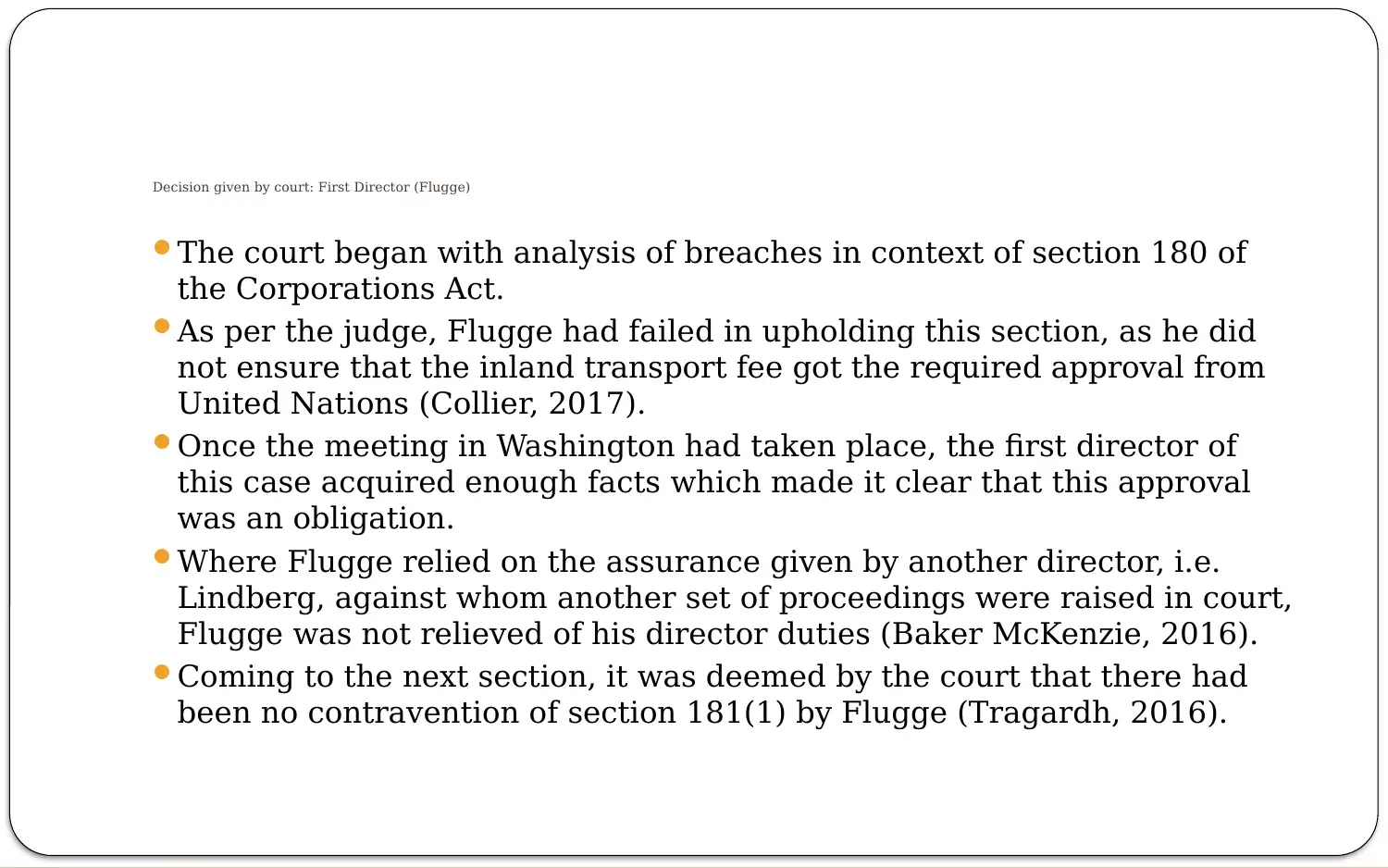
Decision given by court: First Director (Flugge)
The court began with analysis of breaches in context of section 180 of
the Corporations Act.
As per the judge, Flugge had failed in upholding this section, as he did
not ensure that the inland transport fee got the required approval from
United Nations (Collier, 2017).
Once the meeting in Washington had taken place, the first director of
this case acquired enough facts which made it clear that this approval
was an obligation.
Where Flugge relied on the assurance given by another director, i.e.
Lindberg, against whom another set of proceedings were raised in court,
Flugge was not relieved of his director duties (Baker McKenzie, 2016).
Coming to the next section, it was deemed by the court that there had
been no contravention of section 181(1) by Flugge (Tragardh, 2016).
The court began with analysis of breaches in context of section 180 of
the Corporations Act.
As per the judge, Flugge had failed in upholding this section, as he did
not ensure that the inland transport fee got the required approval from
United Nations (Collier, 2017).
Once the meeting in Washington had taken place, the first director of
this case acquired enough facts which made it clear that this approval
was an obligation.
Where Flugge relied on the assurance given by another director, i.e.
Lindberg, against whom another set of proceedings were raised in court,
Flugge was not relieved of his director duties (Baker McKenzie, 2016).
Coming to the next section, it was deemed by the court that there had
been no contravention of section 181(1) by Flugge (Tragardh, 2016).
Paraphrase This Document
Need a fresh take? Get an instant paraphrase of this document with our AI Paraphraser
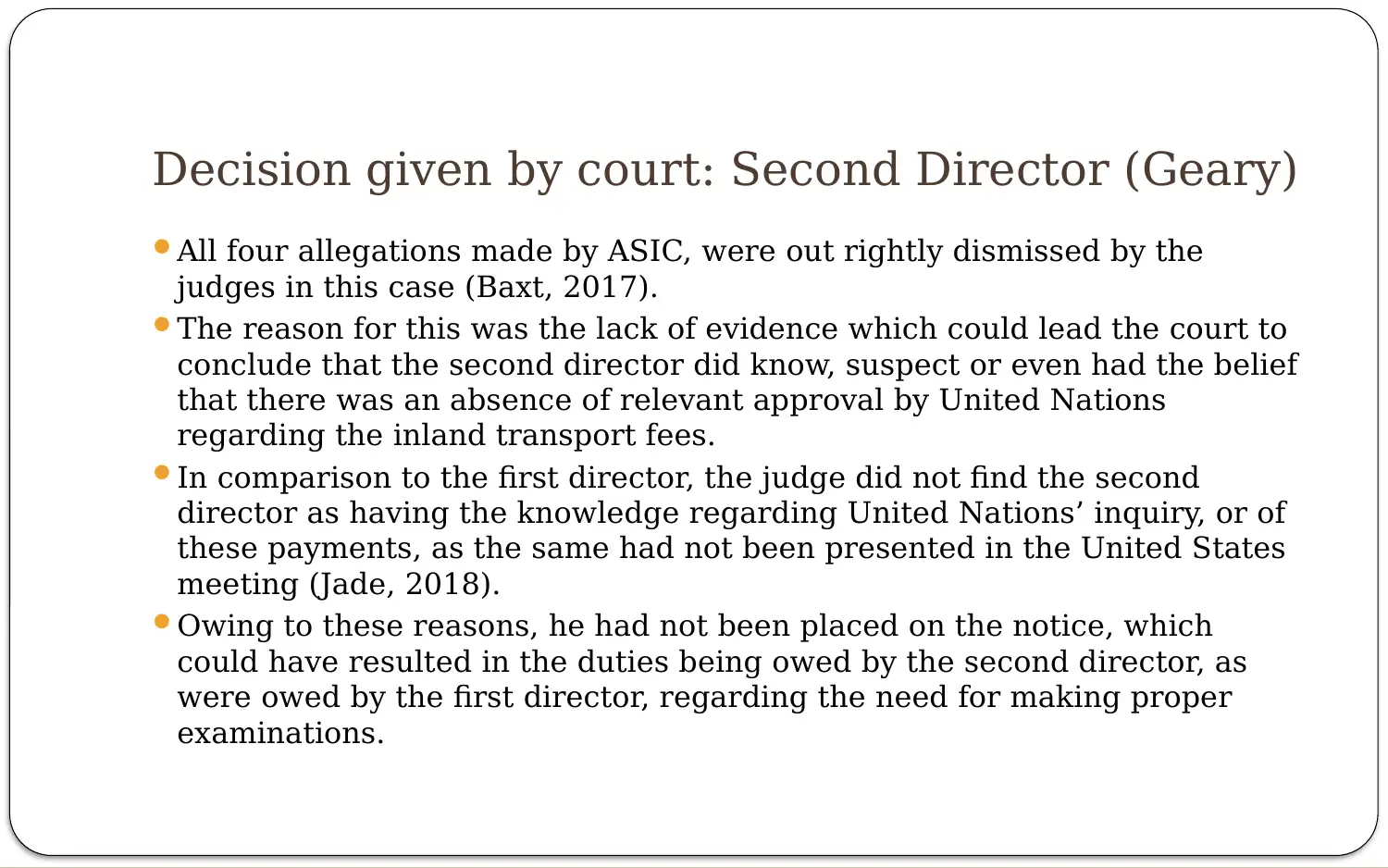
Decision given by court: Second Director (Geary)
All four allegations made by ASIC, were out rightly dismissed by the
judges in this case (Baxt, 2017).
The reason for this was the lack of evidence which could lead the court to
conclude that the second director did know, suspect or even had the belief
that there was an absence of relevant approval by United Nations
regarding the inland transport fees.
In comparison to the first director, the judge did not find the second
director as having the knowledge regarding United Nations’ inquiry, or of
these payments, as the same had not been presented in the United States
meeting (Jade, 2018).
Owing to these reasons, he had not been placed on the notice, which
could have resulted in the duties being owed by the second director, as
were owed by the first director, regarding the need for making proper
examinations.
All four allegations made by ASIC, were out rightly dismissed by the
judges in this case (Baxt, 2017).
The reason for this was the lack of evidence which could lead the court to
conclude that the second director did know, suspect or even had the belief
that there was an absence of relevant approval by United Nations
regarding the inland transport fees.
In comparison to the first director, the judge did not find the second
director as having the knowledge regarding United Nations’ inquiry, or of
these payments, as the same had not been presented in the United States
meeting (Jade, 2018).
Owing to these reasons, he had not been placed on the notice, which
could have resulted in the duties being owed by the second director, as
were owed by the first director, regarding the need for making proper
examinations.
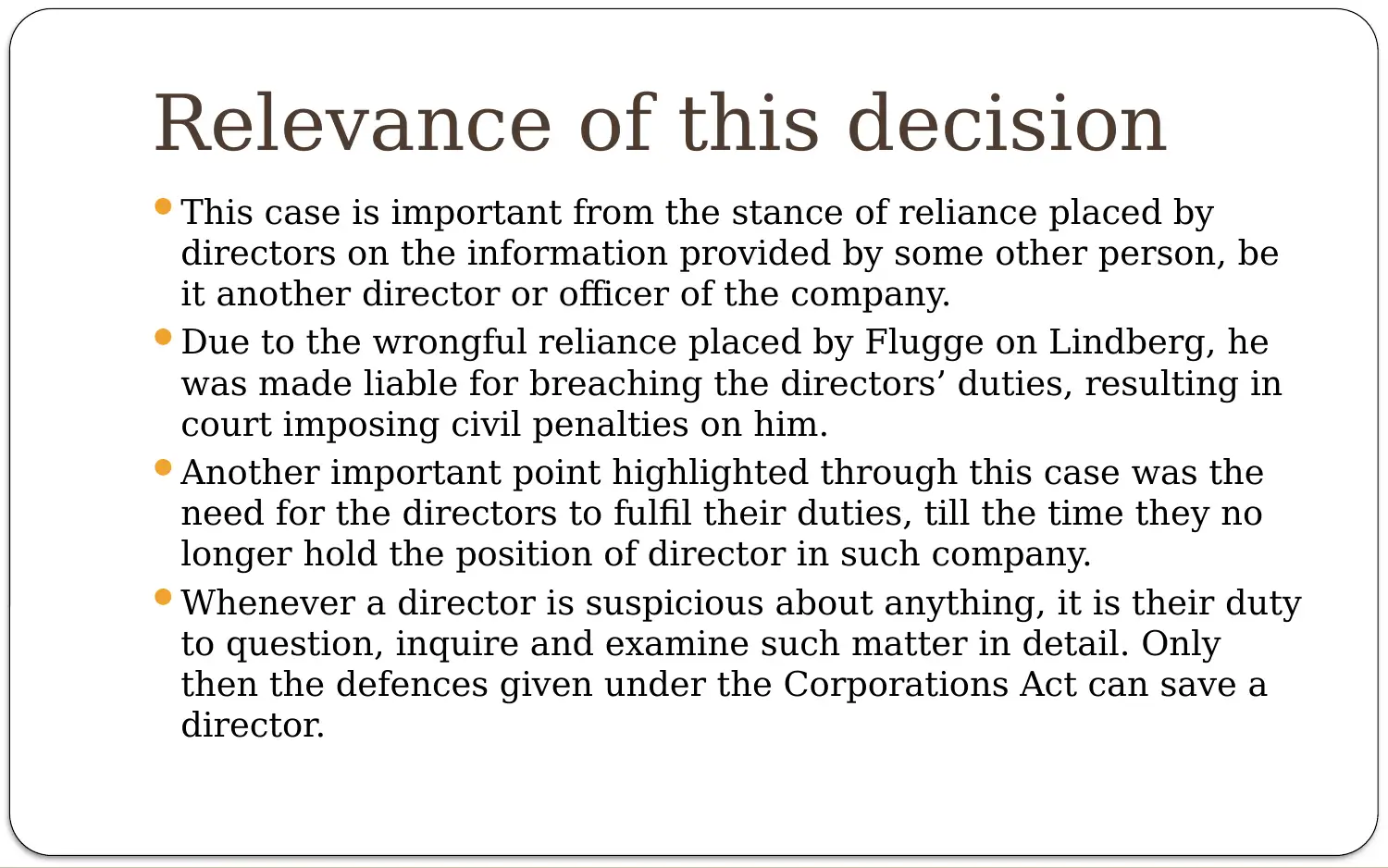
Relevance of this decision
This case is important from the stance of reliance placed by
directors on the information provided by some other person, be
it another director or officer of the company.
Due to the wrongful reliance placed by Flugge on Lindberg, he
was made liable for breaching the directors’ duties, resulting in
court imposing civil penalties on him.
Another important point highlighted through this case was the
need for the directors to fulfil their duties, till the time they no
longer hold the position of director in such company.
Whenever a director is suspicious about anything, it is their duty
to question, inquire and examine such matter in detail. Only
then the defences given under the Corporations Act can save a
director.
This case is important from the stance of reliance placed by
directors on the information provided by some other person, be
it another director or officer of the company.
Due to the wrongful reliance placed by Flugge on Lindberg, he
was made liable for breaching the directors’ duties, resulting in
court imposing civil penalties on him.
Another important point highlighted through this case was the
need for the directors to fulfil their duties, till the time they no
longer hold the position of director in such company.
Whenever a director is suspicious about anything, it is their duty
to question, inquire and examine such matter in detail. Only
then the defences given under the Corporations Act can save a
director.
⊘ This is a preview!⊘
Do you want full access?
Subscribe today to unlock all pages.

Trusted by 1+ million students worldwide
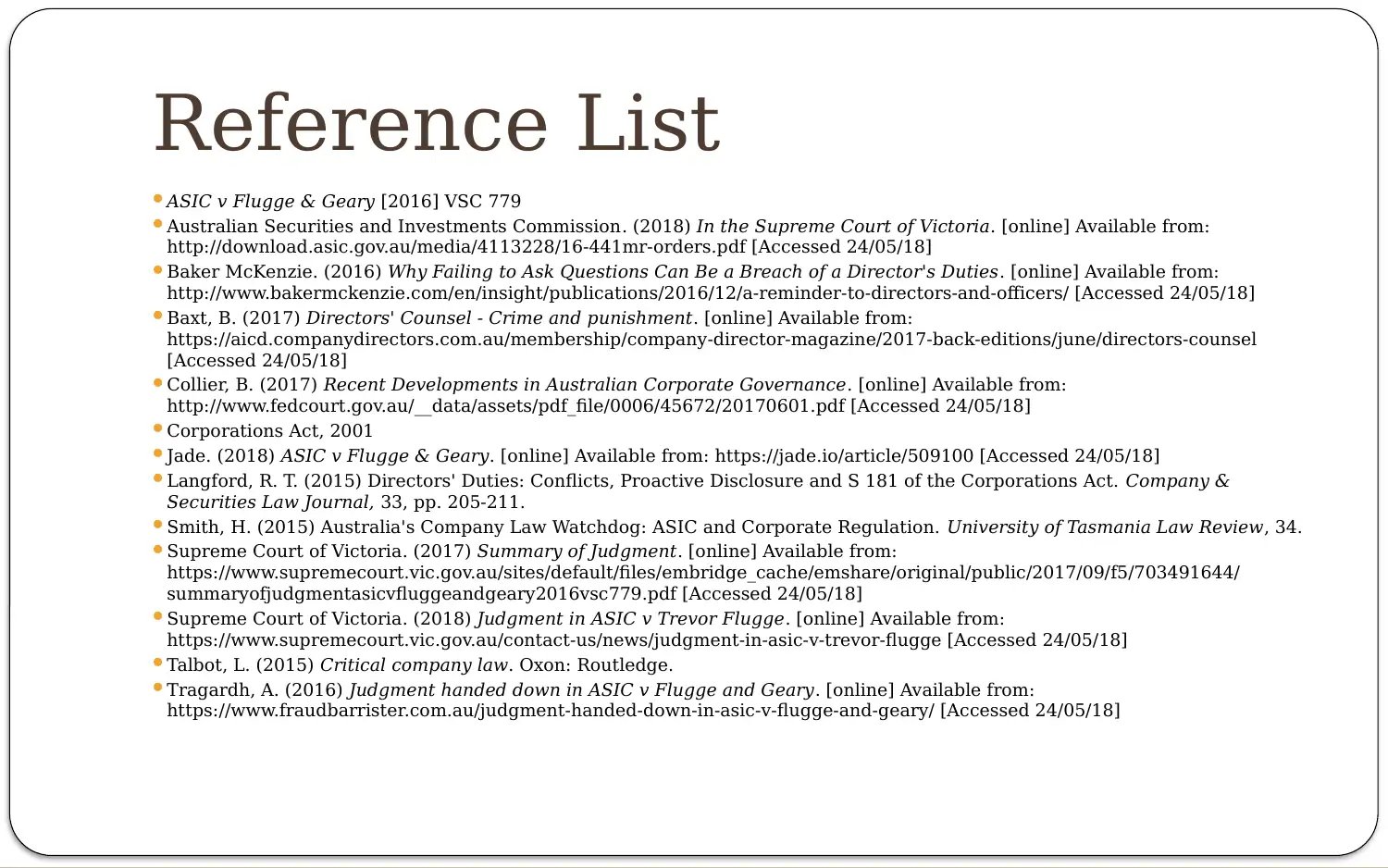
Reference List
ASIC v Flugge & Geary [2016] VSC 779
Australian Securities and Investments Commission. (2018) In the Supreme Court of Victoria. [online] Available from:
http://download.asic.gov.au/media/4113228/16-441mr-orders.pdf [Accessed 24/05/18]
Baker McKenzie. (2016) Why Failing to Ask Questions Can Be a Breach of a Director's Duties. [online] Available from:
http://www.bakermckenzie.com/en/insight/publications/2016/12/a-reminder-to-directors-and-officers/ [Accessed 24/05/18]
Baxt, B. (2017) Directors' Counsel - Crime and punishment. [online] Available from:
https://aicd.companydirectors.com.au/membership/company-director-magazine/2017-back-editions/june/directors-counsel
[Accessed 24/05/18]
Collier, B. (2017) Recent Developments in Australian Corporate Governance. [online] Available from:
http://www.fedcourt.gov.au/__data/assets/pdf_file/0006/45672/20170601.pdf [Accessed 24/05/18]
Corporations Act, 2001
Jade. (2018) ASIC v Flugge & Geary. [online] Available from: https://jade.io/article/509100 [Accessed 24/05/18]
Langford, R. T. (2015) Directors' Duties: Conflicts, Proactive Disclosure and S 181 of the Corporations Act. Company &
Securities Law Journal, 33, pp. 205-211.
Smith, H. (2015) Australia's Company Law Watchdog: ASIC and Corporate Regulation. University of Tasmania Law Review, 34.
Supreme Court of Victoria. (2017) Summary of Judgment. [online] Available from:
https://www.supremecourt.vic.gov.au/sites/default/files/embridge_cache/emshare/original/public/2017/09/f5/703491644/
summaryofjudgmentasicvfluggeandgeary2016vsc779.pdf [Accessed 24/05/18]
Supreme Court of Victoria. (2018) Judgment in ASIC v Trevor Flugge. [online] Available from:
https://www.supremecourt.vic.gov.au/contact-us/news/judgment-in-asic-v-trevor-flugge [Accessed 24/05/18]
Talbot, L. (2015) Critical company law. Oxon: Routledge.
Tragardh, A. (2016) Judgment handed down in ASIC v Flugge and Geary. [online] Available from:
https://www.fraudbarrister.com.au/judgment-handed-down-in-asic-v-flugge-and-geary/ [Accessed 24/05/18]
ASIC v Flugge & Geary [2016] VSC 779
Australian Securities and Investments Commission. (2018) In the Supreme Court of Victoria. [online] Available from:
http://download.asic.gov.au/media/4113228/16-441mr-orders.pdf [Accessed 24/05/18]
Baker McKenzie. (2016) Why Failing to Ask Questions Can Be a Breach of a Director's Duties. [online] Available from:
http://www.bakermckenzie.com/en/insight/publications/2016/12/a-reminder-to-directors-and-officers/ [Accessed 24/05/18]
Baxt, B. (2017) Directors' Counsel - Crime and punishment. [online] Available from:
https://aicd.companydirectors.com.au/membership/company-director-magazine/2017-back-editions/june/directors-counsel
[Accessed 24/05/18]
Collier, B. (2017) Recent Developments in Australian Corporate Governance. [online] Available from:
http://www.fedcourt.gov.au/__data/assets/pdf_file/0006/45672/20170601.pdf [Accessed 24/05/18]
Corporations Act, 2001
Jade. (2018) ASIC v Flugge & Geary. [online] Available from: https://jade.io/article/509100 [Accessed 24/05/18]
Langford, R. T. (2015) Directors' Duties: Conflicts, Proactive Disclosure and S 181 of the Corporations Act. Company &
Securities Law Journal, 33, pp. 205-211.
Smith, H. (2015) Australia's Company Law Watchdog: ASIC and Corporate Regulation. University of Tasmania Law Review, 34.
Supreme Court of Victoria. (2017) Summary of Judgment. [online] Available from:
https://www.supremecourt.vic.gov.au/sites/default/files/embridge_cache/emshare/original/public/2017/09/f5/703491644/
summaryofjudgmentasicvfluggeandgeary2016vsc779.pdf [Accessed 24/05/18]
Supreme Court of Victoria. (2018) Judgment in ASIC v Trevor Flugge. [online] Available from:
https://www.supremecourt.vic.gov.au/contact-us/news/judgment-in-asic-v-trevor-flugge [Accessed 24/05/18]
Talbot, L. (2015) Critical company law. Oxon: Routledge.
Tragardh, A. (2016) Judgment handed down in ASIC v Flugge and Geary. [online] Available from:
https://www.fraudbarrister.com.au/judgment-handed-down-in-asic-v-flugge-and-geary/ [Accessed 24/05/18]
1 out of 10
Related Documents
Your All-in-One AI-Powered Toolkit for Academic Success.
+13062052269
info@desklib.com
Available 24*7 on WhatsApp / Email
![[object Object]](/_next/static/media/star-bottom.7253800d.svg)
Unlock your academic potential
Copyright © 2020–2026 A2Z Services. All Rights Reserved. Developed and managed by ZUCOL.



![In-depth Case Study of ASIC v Flugge & Geary [2016] VSC 779 Law](/_next/image/?url=https%3A%2F%2Fdesklib.com%2Fmedia%2Fdocument%2Fpages%2F2024-07-29%2Fasic-v-flugge-geary-2016-vsc-779-a-case-study-on-directors-duties-page-2.webp&w=256&q=75)
